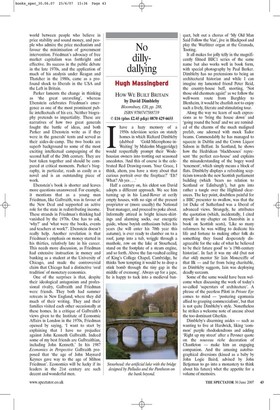No dilly- dallying
Hugh Massingberd How WE BUILT BRITAIN by David Dimbleby Bloomsbury, £20, pp. 288, ISBN 9780747588719 £16 (plus £2.45 p&p) 0870 429 6655 Ihave a hazy memory of a 1950s television series on stately homes in which Richard Dimbleby (dubbed 'Gold-Microphone-inWaiting' by Malcolm Muggeridge) would respectfully prompt their Wodehousian owners into trotting out seasoned anecdotes. 'And this of course is the celebrated Red Drawing-room. Your Grace, I think, ahem, you have a story about that curious portrait over the fireplace?"Eh? What? Ah yes . . .'
Half a century on, his eldest son David adopts a different approach. We see him turning up in his Land-Rover at eerily empty houses, with no sign of the present proprietor or (more usually) the National Trust manager, and proceed to poke about. Informally attired in bright leisure-shirtings and alarming socks, our energetic guide, whose boyish enthusiasm belies his years (he will enter his 70th year this autumn), is ever ready to clamber on to a roof, jump into a tub, wriggle through a manhole, row on the lake at Stourhead, stand on the footplate of a steam engine, and so forth. Above the fan-vaulted ceiling of King's College Chapel, Cambridge, he thinks 'how tempting it would be to drop a stink bomb through the tiny gap in the middle of evensong'. Always up for a jape, he is happy to tuck into a medieval banquet, belt out a chorus of 'My Old Man Said Follow the Van', jive in Blackpool and play the Wurlitzer organ at the Granada, Tooting.
It all makes for jolly telly in the magnificently filmed BBC1 series of the same name but also works well in book form, with special photography by Paul Barker. Dimbleby has no pretensions to being an architectural historian and while I can imagine my lamented friend Peter Reid, the country-house buff, snorting, 'Not those old chestnuts again!' as we follow the well-worn route from Burghley to Blenheim, it would be churlish not to enjoy such a lively, literate and stimulating tour.
Along the way we learn of such expressions as to 'bring the house down' and 'going round the bend' and we are reminded of the charms of the much maligned prefab, one adorned with mock Tudor beams. Commendably he has managed to squeeze in Dublin and the Crown Liquor Saloon in Belfast. In Scotland, he shows how the Hedridean `blackhouses' represent `the perfect eco-house' and explains the misunderstanding of the bogey word 'tenement', which simply means a block of flats. Dimbleby displays a refreshing scepticism towards the new Scottish parliament building (which 'bears no relation to Scotland or Edinburgh'), but gets into rather a tangle over the Highland clearances. The key point, doubtless painful for a BBC presenter to swallow, was that the 1st Duke of Sutherland was a liberal of advanced views. Strangely, he attributes the quotation (which, incidentally, I cited myself in my chapter on Dunrobin in a book on Scottish seats), 'Like so many reformers he was willing to dedicate his life and fortune to making other folk do something they found desperately disagreeable for the sake of what he believed to be their future good' to 'a 19th-century historian'. In fact it was my old (but not that old) mentor Sir lain Moncreiffe of that Ilk — and far from being charitable, as Dimbleby suggests, lain was deploying deadly sarcasm.
Some of the same would have been welcome when discussing the work of today's so-called 'superstars of architecture'. A phrase of the peerless Piloti in Private Eye comes to mind — 'posturing egomania allied to grasping commercialism', but that is not quite Dimbleby's style. Nonetheless he strikes a welcome note of unease about the too dominant Gherkin.
Dimbleby's disarming asides — such as wanting to live at Hardwick, liking 'common' purple rhododendrons and adding 'Right up my street' after a Pevsner quote on the nouveau riche decoration of Chastleton — make him an engaging companion. And the amusing autobiographical diversions (kissed as a baby by John Logie Baird, advised by John Betjeman to go into a monastery to think about his future) whet the appetite for a volume of memoirs.


















































































 Previous page
Previous page